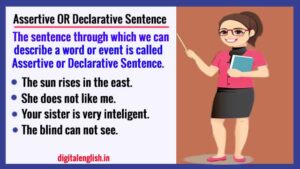Assertive Sentence with Example in details
Assertive Sentence with Example has been explained in details. Learners will get the explanation of declarative sentence step by step here. If he reads the post carefully, he must easily understand it. I am sure that he will not have doubt about assertive sentence.

Assertive sentence is called in another name “Declarative Sentence.”
Assertive Sentence OR Declarative Sentence
The sentence through which we can describe a word or event is called Assertive Sentence.
In English language, most of the time assertive sentences are used. This type of sentence starts with subject/ doer and ends with full stop.
Type of assertive sentence
There are two types of assertive sentences. E.g.
- Affirmative/ Positive Sentence
- Negative Sentence
Affirmative/ Positive Sentence: Affirmative / Positive Sentence expresses the positive meanings of the sentence.
Assertive Sentence with Example [Affirmative]:
- My grandfather reads the Gita in the morning.
- He is using my mobile phone.
- The headmaster has punished the student.
- Girls danced here.
- Father was reading newspaper then.
- We should plant trees.
- Rakib can drive car.
- Mohan will swim in the pond.
- You used to study in this school.
- We must help you.
Negative Sentence: Negative Sentence expresses the negative meanings of the sentence.
Some Tenses do not have “Helping Verb”. We have to bring “Helping Verb” in that tense at the time of writing negative sentence. And “Not” is placed after the “Helping Verb”.
Present Indefinite and Past Indefinite Tense have no helping verb. That is why we use do and does in present indefinite tense, did in past indefinite tense. We place not after those helping verbs.
Assertive Sentence with Example [Negative] according to tense
Present Indefinite or simple Present Tense
When the doer is third person singular number, we use does as a helping verb in negative sentence of present indefinite tense. And then we use present form of main verb and do not add s/es with the main verb.
Example:
- I do not read in this school.
- He does not read newspaper daily.
- We do not sleep at noon.
- You do not take tea in the morning every day.
- They do not use mobile phone.
- Gopal does not eat bread at night.
- She does not give me their mangoes.
Past Indefinite or Simple Past Tense
As simple past tense has no helping verb, we use “Did” in negative sentence. And then we use present form of main verb.
Example:
- I did not play hockey.
- He did not attend the meeting.
- We did not get the news last day.
- You did not take coffee at the restaurant yesterday.
- They did not phone me.
- She did not like you.
- Rahit did not do the work.
The tenses that have helping verb, we place only “Not” after helping verb.
Example:
- He is not playing cricket now.
- You have not helped me.
- He was not catching fish in the pond.
- I will not love you.
- The little bird can not fly.
- Gita must not pass in the exam.
- We should not hate the poor.
- I would not take bathe in the pond.
- Your sister had not taken tea.
- Bimal could not sing a song.
Read More Posts:
- Type of sentences
- Imperative Sentence
- Interrogative Sentence
- Optative Sentence
- Exclamatory Sentence
- Punctuation Mark
- Voice Change
Guy’s I hope you have easily understood “Assertive Sentence with Example” from this post.